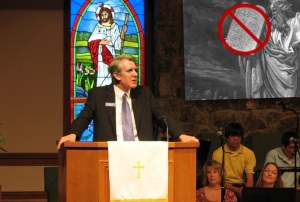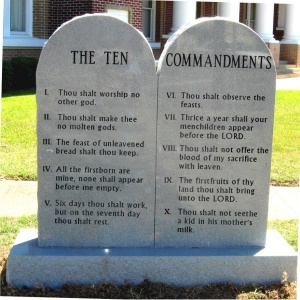For an upcoming project I’ve been trying to find a non-copyrighted translation of the Bible. I was astonished how hard these are to come by. For some strange reason, God’s word needs to be protected by puny human copyright law.
I was only actually able to find two (2) modern translations that are non-copyrighted, public domain works. The Open English Bible, which is not finished, and the World English Bible, which is also not finished, an update of the American Standard Version. (Which is an update of an update of the KJV.)
To find more material we have to go back to books whose copyright has expired. The Darby translation seems to be the most recent book to have fallen into the public domain. (Young’s Literal Translation is another possibility, but I’m not considering it because, frankly, it reads like rubbish. Perfectly literal translations have their place, but this project is primarily literary.)
There is, of course, the original KJV, but I’m not a fool.
So my two best options seem to be the WEB and Darby. But both of these are problematic to a degree. WEB is the product of evangelical missionaries– eww- and I’m worried the translation will be theological biased. (Not that any aren’t, I guess?) As for Darby, it’s over a century old, and the Old Testament seems to be an English translation of a German translation. Not ideal.
So what I’m going to do in this post is a bit of thinking out loud as I compare these two translations to see which, if either, is suitable for my project. The verses are chosen for specific reasons but are in no particular order:
Judges 6:25
I chose this for it’s religious terminology: I’m curious how the translations deal with the term “the asherah” (האשרה), which is thought to refer to a sacred pole or tree representing the goddess Asherah. KJV unhelpfully renders this as “groves”.
Darby:
And it came to pass the same night, that Jehovah said to him, Take the young bullock, which thy father hath, even the second bullock of seven years old, and throw down the altar of Baal that thy father hath, and cut down the Asherah that is by it;
Ooh, a direct transliteration of the term. I likey. I do not likey the term Jehovah (it’s just a weird obfuscation of Yahweh), but a little “find and replace” can fix that.
So the language is a little archaic, but comprehensible.
WEB:
It happened the same night, that Yahweh said to him, “Take your father’s bull, even the second bull seven years old, and throw down the altar of Baal that your father has, and cut down the Asherah that is by it.
Well, very similar to Darby. Again Asherah is nicely transliterated. Language is much more modern.
Point: WEB.
Judges 19:22
Now let’s see how each translation deals with threats of rape.
Darby:
They were making their hearts merry, when behold, the men of the city, sons of Belial, surrounded the house, beating at the door; and they spoke to the master of the house, the old man, saying, Bring forth the man that came into thy house, that we may know him.
WEB:
As they were making their hearts merry, behold, the men of the city, certain base fellows, surrounded the house, beating at the door; and they spoke to the master of the house, the old man, saying, “Bring out the man who came into your house, that we may have sex with him!”
I like that WEB is frank and to the point. I also like that it avoids the direct translation “sons of belial”, which I think misconstrues a Hebrew idiom to personify the word belial (בליעל, wickedness or decadence). (“Satan” underwent a similar process.)
Point: WEB
Leviticus 26:30
More religious terminology.
Darby:
And I will lay waste your high places, and cut down your sun-pillars, and cast your carcases upon the carcases of your idols; and my soul shall abhor you.
WEB:
I will destroy your high places, and cut down your incense altars, and cast your dead bodies upon the bodies of your idols; and my soul will abhor you.
I’ve never heard of the Israelites worshipping sun-pillars.
Point: WEB
Judges 5:2
How do these translations deal with “obscure” Hebrew? By obscure, of course, I mean “this Hebrew was written down so long ago nobody that knows what this shit actually means so lets make something up.” In this verse, the bolded term’s meaning is unknown.
Darby:
For that leaders led in Israel, For that the people willingly offered themselves, Bless Jehovah!
WEB:
“Because the leaders took the lead in Israel,
because the people offered themselves willingly,
be blessed, Yahweh!
Well first off, nice to know WEB marks poetry as such. That will save me some time! But they both take the same tack.
For comparison’s sake, let’s bring in Young’s Literal Translation, and see how literal it can be with uncertain words:
YLT:
For freeing freemen in Israel, For a people willingly offering themselves Bless ye Jehovah.
Yeah no.
Isaiah 7:14
Okay, how about one of the most famously mis-translated words in the entire Bible? I’m talking about Isaiah’s “young woman” whom Christians mistook for a “virgin”, an issue that still affects translations of the Hebrew Bible.
Darby:
Therefore will the Lord himself give you a sign: Behold, the virgin shall conceive and shall bring forth a son, and call his name Immanuel.
Booo! Hiss!!
WEB:
Therefore the Lord himself will give you a sign. Behold, the virgin will conceive, and bear a son, and shall call his name Immanuel.
Well, crap. Isaiah isn’t even in the purview of this project (at least not for a while), but this makes clear that the WEB is theologically biased. Luckily I can fix mistakes like this- the main problem will be finding them.
Exodus 3:14
Let’s now turn to a pivotal verse that always loses a lot in translation: God’s declaration (via burning shrubbery) that he is I AM. (It’s a pun on his name. God loves puns!)
Darby
And God said to Moses, I AM THAT I AM. And he said, Thus shalt thou say unto the children of Israel: I AM hath sent me unto you.
WEB
God said to Moses, “I AM WHO I AM,” and he said, “You shall tell the children of Israel this: ‘I AM has sent me to you.’”
Both very similar. And I just noticed that WEB uses quotation marks, which is handy. Gotta say I haven’t seen any advantage to Darby and no big issues with the WEB.
Yeah, that’s it. My conclusion isn’t exactly a nail-biter: the modern translation beats out the century-old one. I see no major issues with the WEB. It is a bit stilted and conservative (I’m used to the New English Bible, a peculiarly literary translation), but it’s by far my best option. In any event I am free to edit so I will swap terminology here and there or clean up other issues. The WEB is truly open source, as God’s word should be! From the WEB FAQ:
May I change or translate the World English Bible?
Yes and no. Because the World English Bible is God’s Word, you may not do anything to change the meaning of the text. That is God’s rule, not mine.
Mwahahaha.





